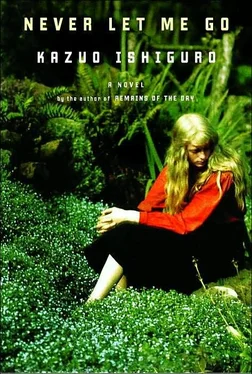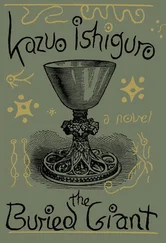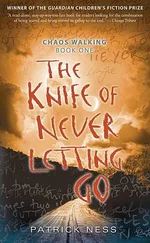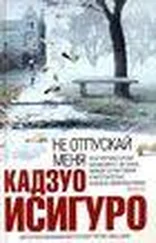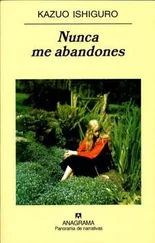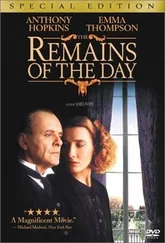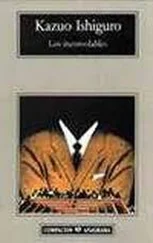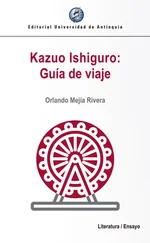“I suppose not. Wasn’t thinking. But I always see Hailsham being like this now. No logic to it. In fact, this is pretty close to the picture in my head. Except there’s no boat, of course. It wouldn’t be so bad, if it’s like this now.”
“That’s funny,” Ruth said, “because I was having this dream the other morning. I was dreaming I was up in Room 14. I knew the whole place had been shut down, but there I was, in Room 14, and I was looking out of the window and everything outside was flooded. Just like a giant lake. And I could see rubbish floating by under my window, empty drinks cartons, everything. But there wasn’t any sense of panic or anything like that. It was nice and tranquil, just like it is here. I knew I wasn’t in any danger, that it was only like that because it had closed down.”
“You know,” Tommy said, “Meg B. was at our centre for a while. She’s left now, gone up north somewhere for her third donation. I never heard how she got on. Have either of you heard?”
I shook my head, and when I didn’t hear Ruth say anything, turned to look at her. At first I thought she was still staring at the boat, but then I saw her gaze was on the vapour trail of a plane in the far distance, climbing slowly into the sky. Then she said:
“I’ll tell you something I heard. I heard about Chrissie. I heard she completed during her second donation.”
“I heard that as well,” said Tommy. “It must be right. I heard exactly the same. A shame. Only her second as well. Glad that didn’t happen to me.”
“I think it happens much more than they ever tell us,” Ruth said. “My carer over there. She probably knows that’s right. But she won’t say.”
“There’s no big conspiracy about it,” I said, turning back to the boat. “Sometimes it happens. It was really sad about Chrissie. But that’s not common. They’re really careful these days.”
“I bet it happens much more than they tell us,” Ruth said again. “That’s one reason why they keep moving us around between donations.”
“I ran into Rodney once,” I said. “It wasn’t so long after Chrissie completed. I saw him in this clinic, up in North Wales. He was doing okay.”
“I bet he was cut up about Chrissie though,” said Ruth. Then to Tommy: “They don’t tell you the half of it, you see?”
“Actually,” I said, “he wasn’t too bad about it. He was sad, obviously. But he was okay. They hadn’t seen each other for a couple of years anyway. He said he thought Chrissie wouldn’t have minded too much. And I suppose he should know.”
“Why would he know?” Ruth said. “How could he possibly know what Chrissie would have felt? What she would have wanted? It wasn’t him on that table, trying to cling onto life. How would he know?”
This flash of anger was more like the old Ruth, and made me turn to her again. Maybe it was just the glare in her eyes, but she seemed to be looking back at me with a hard, stern expression.
“It can’t be good,” Tommy said. “Completing at the second donation. Can’t be good.”
“I can’t believe Rodney was okay about it,” Ruth said. “You only spoke to him for a few minutes. How can you tell anything from that?”
“Yeah,” said Tommy, “but if like Kath says, they’d already split up…”
“That wouldn’t make any difference,” Ruth cut in. “In some ways that might have made it worse.”
“I’ve seen a lot of people in Rodney’s position,” I said. “They do come to terms with it.”
“How would you know?” said Ruth. “How could you possibly know? You’re still a carer.”
“I get to see a lot as a carer. An awful lot.”
“She wouldn’t know, would she, Tommy? Not what it’s really like.”
For a moment we were both looking at Tommy, but he just went on gazing at the boat. Then he said:
“There was this guy, at my centre. Always worried he wouldn’t make it past his second. Used to say he could feel it in his bones. But it all turned out fine. He’s just come through his third now, and he’s completely all right.” He put up a hand to shield his eyes. “I wasn’t much good as a carer. Never learnt to drive even. I think that’s why the notice for my first came so early. I know it’s not supposed to work that way, but I reckon that’s what it was. Didn’t mind really. I’m a pretty good donor, but I was a lousy carer.”
No one spoke for a while. Then Ruth said, her voice quieter now:
“I think I was a pretty decent carer. But five years felt about enough for me. I was like you, Tommy. I was pretty much ready when I became a donor. It felt right. After all, it’s what we’re supposed to be doing, isn’t it?”
I wasn’t sure if she expected me to respond to this. She hadn’t said it in any obviously leading way, and it’s perfectly possible this was a statement she’d come out with just out of habit—it was the sort of thing you hear donors say to each other all the time. When I turned to them again, Tommy still had his hand up to shade his eyes.
“Pity we can’t go closer to the boat,” he said. “One day when it’s drier, maybe we could come back.”
“I’m glad to have seen it,” Ruth said, softly. “It’s really nice. But I think I want to go back now. This wind’s quite chilly.”
“At least we’ve seen it now,” Tommy said.

We chatted much more freely on our walk back to the car than on the way out. Ruth and Tommy were comparing notes on their centres—the food, the towels, that kind of thing—and I was always part of the conversation because they kept asking me about other centres, if this or that was normal. Ruth’s walk was much steadier now and when we came to the fence, and I held up the wire, she hardly hesitated.
We got in the car, again with Tommy in the back, and for a while there was a perfectly okay feeling between us. Maybe, looking back, there was an atmosphere of something being held back, but it’s possible I’m only thinking that now because of what happened next.
The way it began, it was a bit like a repeat of earlier. We’d got back onto the long near-empty road, and Ruth made some remark about a poster we were passing. I don’t even remember the poster now, it was just one of those huge advertising images on the roadside. She made the remark almost to herself, obviously not meaning much by it. She said something like: “Oh my God, look at that one. You’d think they’d at least try to come up with something new.”
But Tommy said from the back: “Actually I quite like that one. It’s been in the newspapers as well. I think it’s got something.”
Maybe I was wanting that feeling again, of me and Tommy being brought close together. Because although the walk to the boat had been fine in itself, I was starting to feel that apart from our first embrace, and that moment in the car earlier on, Tommy and I hadn’t really had much to do with each other. Anyway, I found myself saying:
“Actually, I like it too. It takes a lot more effort than you’d think, making up these posters.”
“That’s right,” Tommy said. “Someone told me it takes weeks and weeks putting something like that together. Months even. People sometimes work all night on them, over and over, until they’re just right.”
“It’s too easy,” I said, “to criticise when you’re just driving by.”
“Easiest thing in the world,” Tommy said.
Ruth said nothing, and kept looking at the empty road in front of us. Then I said:
“Since we’re on the subject of posters. There was one I noticed on the way out. It should be coming up again pretty soon. It’ll be on our side this time. It should come up any time now.”
Читать дальше
